The Women Calling the Shots
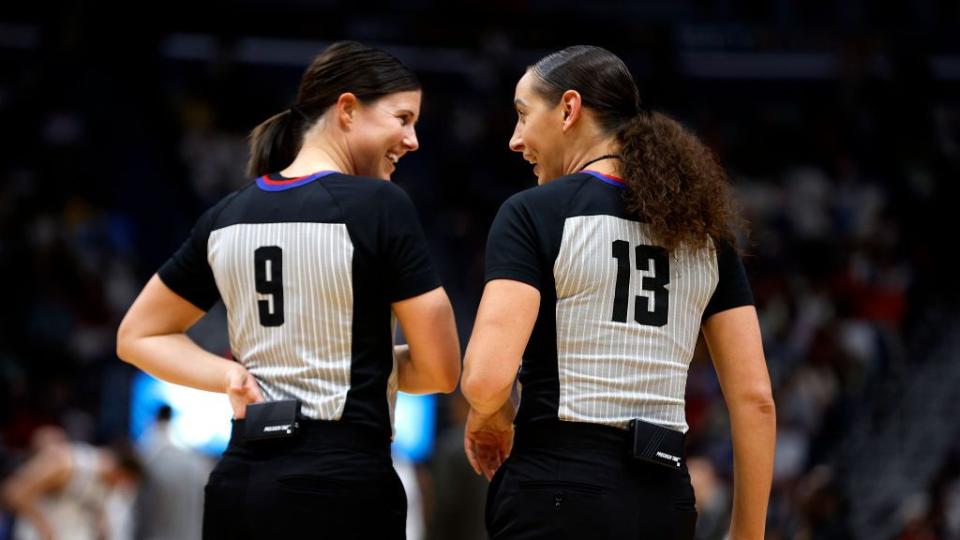
There have been several hoops to jump through on the journey to gender equality in sports, especially basketball, but things are finally looking up. Salaries for WNBA players are increasing, and the league’s popularity is at an all-time high, thanks in part to rookies like Caitlin Clark and Angel Reese. The WNBA has always been a role model for C-suite diversity, and while NBA front offices are nowhere near having equal gender representation, with each passing season, more teams employ female executives. On the court, only a fraction of referees are women—but that number is also growing. Today, there are eight full-time female refs in the NBA, one who’s non-binary, and 65 men. It is the most women the league has ever had at one time.
Four-season veteran Simone Jelks encapsulates making history as one of these refs in four simple words: “We are the shit!” Ahead of the NBA finals, which kick off tonight between the Boston Celtics and the Dallas Mavericks, Jelks and her fellow NBA refs open up about what it’s like working in a male-dominated profession, advocating for equality in and out of the arena, and the pressures of having 20,000 very, ahem, opinionated NBA fans screaming at you on the regular.
On the unprecedented rise of women in basketball
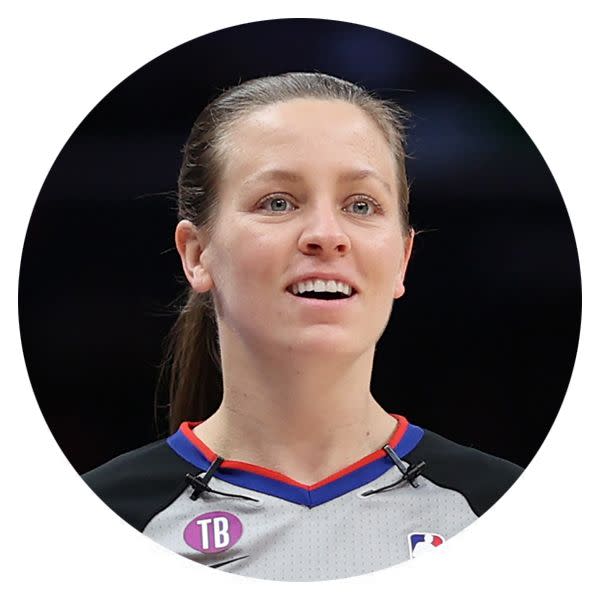
Dannica Mosher: It’s about time that happened! It’s different being a referee—there are eight of us here, and you can see us on the floor. But what’s behind the scenes of the NBA? The higher execs, the team execs. It’d be nice to see a female coach, I know [former assistant coach for the San Antonio Spurs] Becky [Hammon] was in the running for a little bit. There’s always more that can be done, but I love this moment. Maybe it started with us, I don’t know.
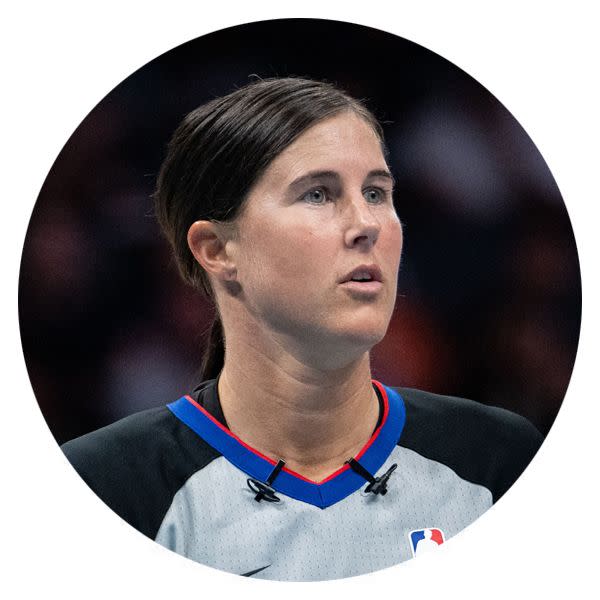
Natalie Sago: Visibility is everything. This draft class was awesome. Yes, Caitlin Clark, but also Kamilla Cardoso, Angel Reese, there were so many. My best friend has two little girls and they’re always like, “Mom, when is Caitlin Clark playing?” And we have so many friends that referee in the WNBA, so it’s neat to be able to see them get publicity as well. I’m glad they’re getting their time, and I hope it continues to stay that way.
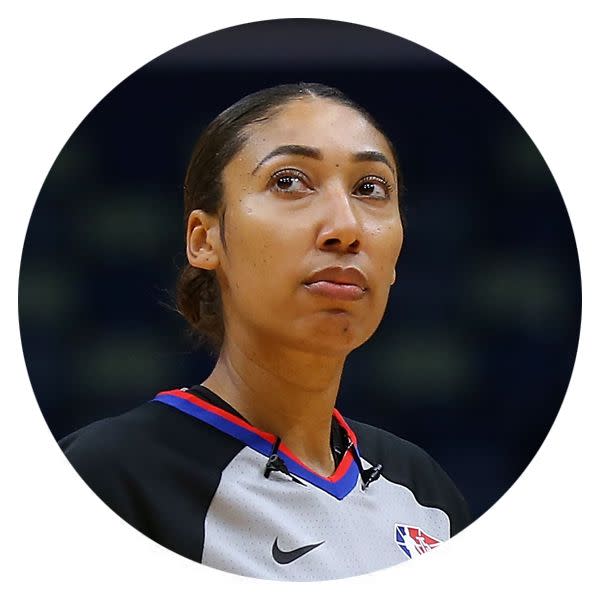
Simone Jelks: It’s probably the first time in a few years my boyfriend has ever switched over to watch a women’s game while an NBA game was on.
On finding calm in the midst of chaos
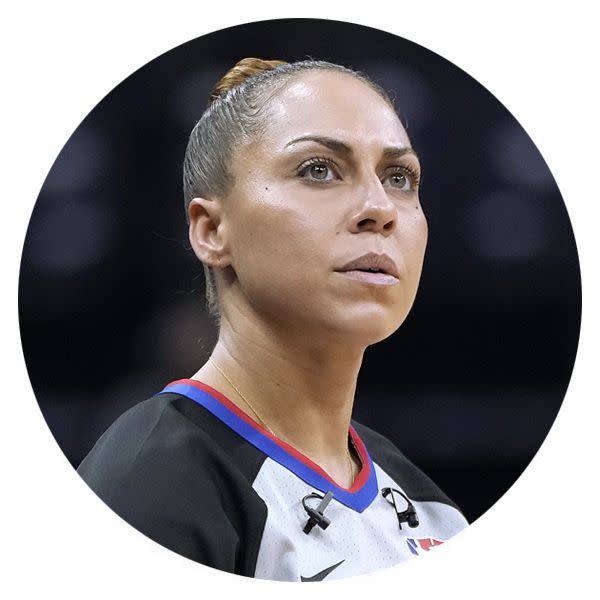
Sha’rae Mitchell: Honestly, the hardest part was getting my colleagues to trust me. These guys have been in the league for 20 or 30 years. They need to know that I know what I’m doing. You can only do that by doing the work. There’s no other way around it. So honestly, my first year was hard.
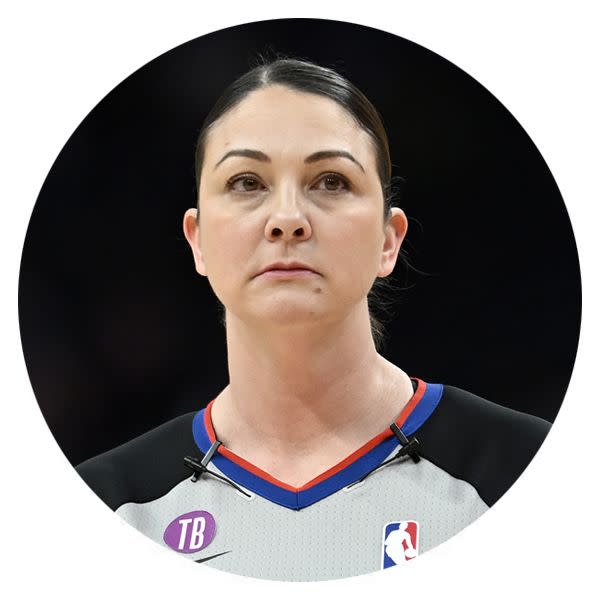
Lauren Holtkamp-Sterling: I remember being astounded at the speed of play during my early games. I had worked in the G-league [the NBA’s minor league] for six years, and I had worked in the WNBA for four seasons. The training is exceptional. And still, when I got on the court that first year, everything was just really fast. [I had to acclimate to] the speed of processing and making decisions and being on such a large stage. Plus, the feeling of 20,000 people coming down on our crew or coming down on me as a referee was crazy. But there’s also the exhilaration of when 20,000 people are caught up in what’s happening on the court. As a ref, you have to remember to stick to the training and find your place of calm.
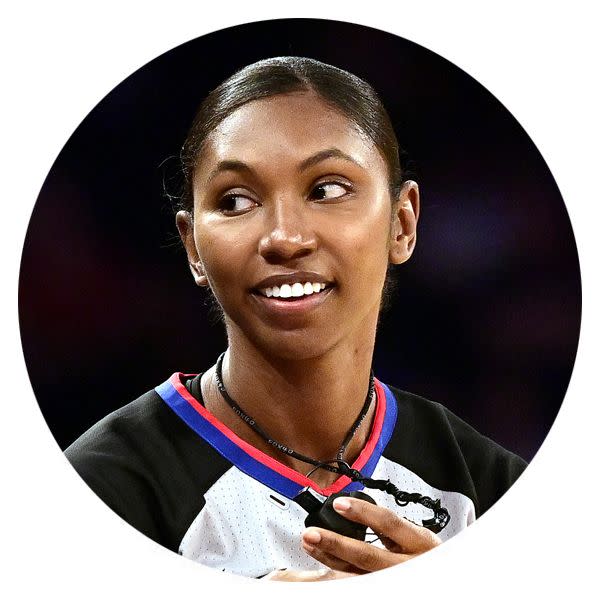
Danielle Scott: I started during COVID, so there were no fans. That was a huge thing that I had to get used to. When the fans returned to the arenas, I was super anxious and excited at first, but it’s mellowed out the more games that I’ve officiated.
On the hardest challenges—and biggest rewards—of being a female ref in the NBA
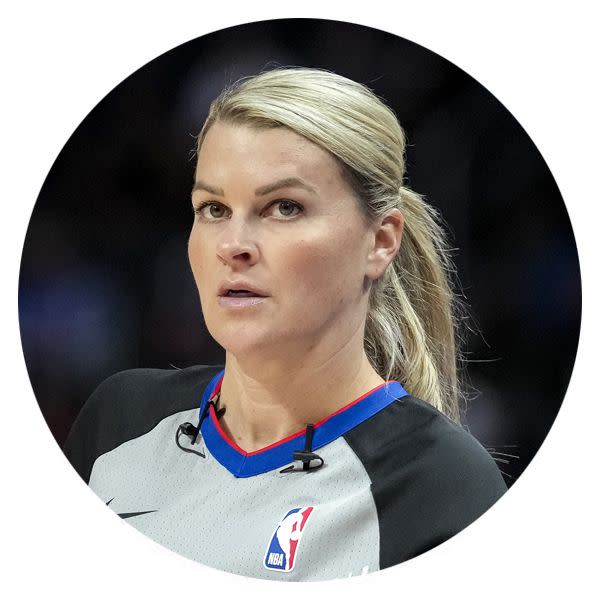
Jenna Schroeder: Referees in general are under so much scrutiny, especially with social media and talking heads. Everyone needs someone else to blame for their issues, so we are the people they blame. I’ve got a really good therapist. I think everyone should have one. It helps. I will say, once you are in the arena with thousands of people, it’s exhilarating. You can’t get that feeling anywhere else.

NS: The impact that you can make on other people is something that still gets me. [When] little girls or boys run up and down the sideline while I’m warming up to take their picture with me, it’s like, Whoa, somebody wants to take their picture with me? All the fans coming down on you is challenging, but that’s also a fun part of the job. It fuels me. You’re out there running around with the best athletes in the world, and sometimes I just have to stop and think, Wow, this is so cool.
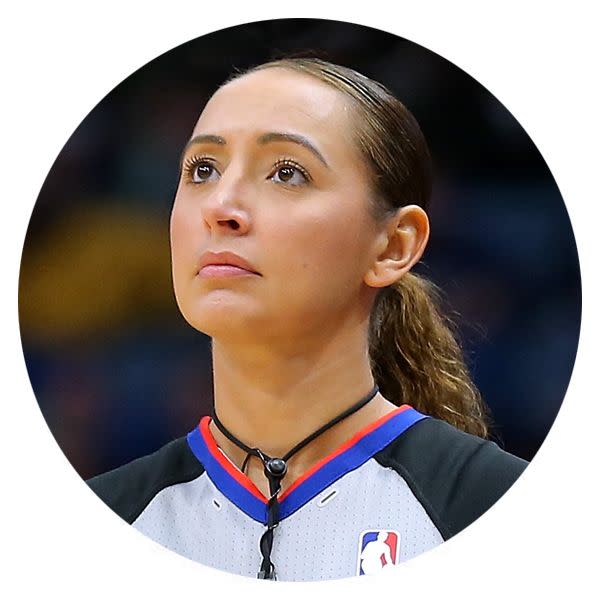
Ashley Moyer-Gleich: I’m not sure if people realize that we’re away for six months. We’re on the road six days a week. The players and the team have 50 percent of their games at home. Usually, 99 percent of our games are away, and we miss that time with our family. [We miss] milestones and birthdays. It is a grueling job, and I feel like that’s the worst part about it, but the best part is becoming role models [for our families]. My mom is my best friend, and she’s so proud.

SJ: I love that my dad talks to his golf buddies about me. They’re probably tired of him talking about me, but my parents are so pleased. They’ve been my supporters forever, and to see them still be proud of their 38-year-old daughter is something that’s very rewarding about this job. Also, I live in the inner city of Cleveland and I taught here. I have [former] students who are in the prison system, they’re in the streets. I remember telling some of them that I stopped teaching because I wanted to be an NBA ref, and they were like, “Yeah, okay Miss Jelks.” To run across them now, they say, “You really did that!” Some of them are in jail watching me on TV.

DM: I came super close to being a nurse. Having basketball as a career rather than holding people’s lives in my hands…no one’s going to die when I’m refereeing, so that’s probably the best part for me. Sure, there’s a lot of pressure, but it’s not a life-or-death kind of pressure.
On the physicality of refereeing—and the importance of a good support system

DM: Nothing can prepare you for the NBA except the on-the-floor experience. The more years of experience you get, the more comfortable you’ll be. I’m only in year two [of being a ref], so it’s still very uncomfortable. I don’t know how it will feel in year 10...but I assume it gets a little easier. I’ve still got a lot to learn, and a lot of room for growth.

SM: Everyone’s training is a little bit different, because everyone’s journey is different. The reason I started refereeing is because of my 9-year-old twins. I was a mom before I was a referee. I got into refereeing because I wanted to get back in shape. You’re required to have a certain level of fitness to be on the court. And so I enjoyed that process, but I think we need more mental training. The physical part is that you’ve got to be able to run and get up and down the court and be a certain weight or whatever. But the mental part...there is nothing that prepares you for the pressure that comes from it. I remember the first time I was in Madison Square Garden, I called a carry on [Knicks guard] Jalen Brunson—and it was a carry—but the way [the fans] came down on me, I thought I was going to die. I’m looking around like, Oh my god, they’re coming after me after this game. My life’s over. Nothing prepares you for that.

AMG: I can run 20 miles every day over the summer, and when I go work my first pre-season game in October, I’m going to feel like a train hit me. There is nothing like running up and down the floor with NBA players. For those of us who are moms, it’s hard on our kids, it’s hard on our families. It’s a journey for sure, and for us to be able to rely on each other, and have a support system, that we’re all women going through the same thing together, it helps.

SJ: I advanced pretty quickly in the league without refereeing in the WNBA, and only [worked] three seasons in the G-League. So that was challenging for me, because I know human nature and I’ve been around competitive men for a very long time. The only way to fix that is to do the work. In my early days, I would listen to sermons by female pastors to help with mental preparation. Also, I’m a very family-oriented person. I do not look forward to that at all when I come back [from maternity leave]. I have a baby now, and I’ve been able to spend every minute with my son. I’ll tell my mom, “Maybe we should take him on the road once a week.” And she’ll say, “Simone, calm down. We’ll figure it out.” But I’m paranoid about that, because I think that’s going to be very challenging for me this upcoming season.
On keeping each other in check during the NBA season

JS: We have a group text thread, and we try to support each other as much as we can. There are experiences that the women [referees] go through that the men don’t have to deal with. Like when we’re told to “go back to the kitchen” and things like that. Also, the text thread is for get-togethers too. I live in Detroit, so if someone’s in Detroit, and I am home, I can cook them dinner. I was just in Atlanta and I went to Lauren’s house and she made me lunch. Those little things can make a difference. Being on the road can be a very lonely place. I was just telling Natalie that I’m Delta SkyMiles poor right now, because I fly my family to my games all the time. I have no SkyMiles left!

SJ: We all have different personalities. Lauren checks in. She’ll leave me six voicemails, and sometimes I call her back, but sometimes I don’t. I’m kind of the loner in the group. I don’t do a lot of reaching out, but I do when I think it’s something serious. I think it’s great that everyone’s different. We all lean on different people for different reasons at different times.

DM: We do have those moments where we need to have each other’s backs and we will be there for each other when needed.
On winding down after the fourth quarter

DM: Well, I’m not scared to say that I love a glass of wine following [a game].

JS: Yeah, if we’re being honest, I’m probably at a bar or something with everyone on staff. I’m not typically in bed before 1 A.M., because it takes a lot for my mind to chill.

AMG: Before having my son, I was a huge reality TV fan. But now I’m obsessed with the Food Network and Beat Bobby Flay. I used to watch Grey’s Anatomy on repeat. I must have watched all the seasons hundreds of times.
On being the second-ever woman to ref a playoff game

AMG: Being able to officiate a playoff game is just opening up the opportunity for other [female referees]. We want to keep opening doors for everyone else. It’s a big deal.
These interviews have been edited and condensed for clarity.
You Might Also Like

 Yahoo Sports
Yahoo Sports 
